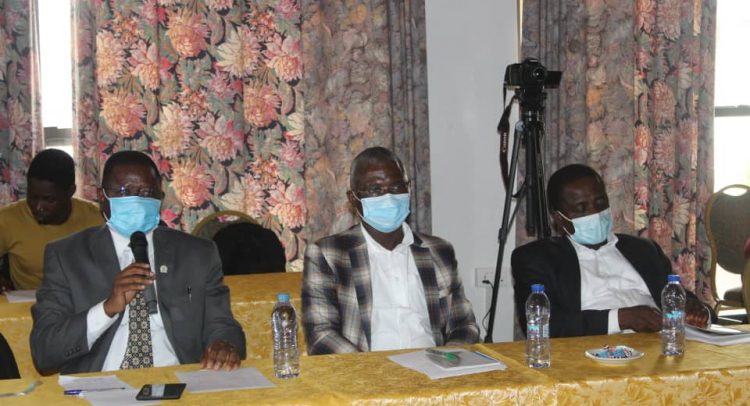Dr. Winfred Ofosu (middle) with other health officials at the dissemination of the project report.
The Upper East Region (UER) has recorded significant improvement in the quality of services offered to mothers and their newborns at various health facilities, according to the Mother, Baby Friendly Health Facility Initiative, (MBFHI) project.
The results of the three-year project implemented by the Upper East Regional Health Administration, UNICEF and the Navrongo Health Research Centre indicated that issues such as exclusive breastfeeding, basic Water Sanitation and Hygiene (WASH) services in labour wards, skilled attendants who wear PPE for patient care and signposts to guide clients at health facilities increased within the period.
Regional Health Administrator, UER, Sadia Salifu, presenting the detailed outcome of the project said the aim was to improve facility-based quality of care for mothers and newborns, increase optimal breastfeeding practices and improve postnatal and community care for newborns and infants.
She said the project was implemented in the Bawku, Bolga, Bongo and Kassena Nankana West Districts in three hospitals, 31 health centres and 82 Community Health Planning Service (CHPS) centres adding that the intervention areas saw improvements in practices especially those that had relatively lower prevalence at baseline.
“We engaged women, their mothers’ in-law, families and entire communities on the benefits of exclusive breastfeeding, basic WASH services in labour wards of intervention facilities increased from 63% to 100% compared to 63 to 88% in comparison facilities. Skilled attendants who wear PPE for patient care increased from 54% to 97% in intervention facilities at post-implementation,” she said.
Principal Medical Officer at the Navrongo Health Research Center (NHRC) Dr John Williams, presenting the report of health facilities under the project said the process of engagement strengthened communities’ relations with CHPS staff and other government services.
He said the engagement of community leadership helped nurture a positive community environment for maternal and newborn care and exclusive breastfeeding.
He explained that beliefs, behaviours and situations that prevented the best care for mothers and babies were brought to light during community gatherings and discussed with community members in the presence of the community health management committees and CHPS staff.
Upper East Regional Director of Health Services (RDHS) Dr Winfred Ofosu, said appropriate governance structures were put in place for service providers and retooling for health facilities for better mother and baby-friendly services was done under the project.
“Civil Society organizations were engaged to create demand generation for breastfeeding,” he added.
He said the project has contributed immensely to improving maternal and newborn indicators in the region.
“We are happy that the initiative ended successfully with impressive findings. I take this opportunity to express my sincere appreciation to all health staff that participated in this programme and who worked tirelessly day and night to ensure this can be done,” he said.
The project, however, recommended that the GHS develop an integrated and consolidated model of the approach that can be used by all agencies.
“GHS should ensure the sustainability of the clinical mentorship component which effectively enables lower-level staff to learn intermediate skills from specialists. Leadership should ensure the integration of the model into all in-service training programmes,” it stated.
By Jamila Akweley Okertchiri

